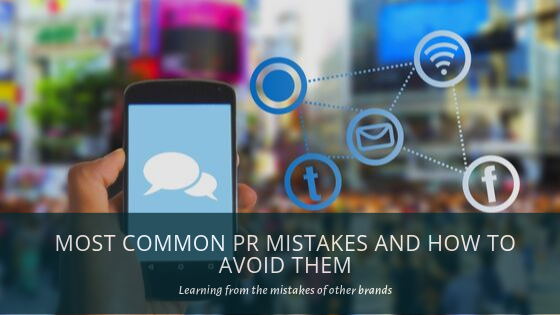Today, more businesses realise the importance of PR to develop their image and brand potential. Even without a PR professional, you’ll find plenty of tips online to get started. However, while proactive advice is great, you should also be aware of the most common pitfalls. Below, we’ve covered the most common PR mistakes companies make and how to avoid them.
We discuss some common misconceptions every entrepreneur has about public relations.
Only targeting the most popular media outlets
Every company dreams of being promoted by the big names in the

Firstly, remember that these publications are going to need to see a benefit in promoting your brand. These outlets tend to make their money from advertising and subscriptions. For this reason, editors generally prefer to publish articles about established brands because they draw more traffic. Unless your story is groundbreaking, you’ll probably struggle to break through. However, if you’ve built up a reputation through smaller outlets, you’re more likely to succeed.
Read this insider’s guide to making PR work for your startup.
There’s also the question of resource allocation. Is it worth spending the time and manpower contacting the biggest outlets with a lower chance of success? It depends. Ask yourself if the editors have something to gain from publishing your story. Is their audience appropriate for your message? Be honest with yourself. If the answer is no, it’s better to focus your efforts on smaller, targeted blogs and outlets. Quality is always better than quantity, regardless of who you contact. If you spend time crafting excellent content for smaller but relevant blogs, your reputation will grow.
What’s more, you’ll learn a lot as you progress. Your pitches will improve, as will your media relations and the quality of your content. By the time you’re ready to approach the most significant outlets, you’ll find it much easier to be heard.
Not having the right pitch
Believe it or not, many new businesses struggle with pitching to the media. If you’ve pitched to investors, buyers, or customers, you know the importance of the perfect pitch. This is no different when it comes to PR.

Finding the best pitch for your brand is definitely a learning process. With all pitches, the key is putting yourself in the recipient’s shoes. Fortunately, if you’ve followed the advice in the last point, you’ll have done your research. Having a tried and tested structure for your pitches is excellent, but you’ll need to be flexible to appeal to different targets. Journalists likely receive dozens, if not hundreds, of pitches a day, so rarely have the time to trawl through mountains of information. At the same time, there need to be enough details to catch their attention. So, how should you structure your pitch?
It’s best to start with a brief introduction to your story, focusing on the key points. End your pitch with a short finalising statement. If you have any supporting links or details, attach them separately to your email. This gives journalists the opportunity to learn more without being overwhelmed by the primary email.
We discuss the key elements of a PR pitch with a personality.
Poor media relation strategies
This is one of the more common PR mistakes that startups make. As with pitching, you need to bear your target audience in mind. In this case, that’s the journalist or outlet editor. It’s tempting to run with a story you believe personally is important and interesting. However, it’s worth getting advice from a PR professional. These people understand how the media thinks and can provide invaluable guidance. A poor pitch or story won’t just result in a lack of promotion. There’s a chance you could end up souring your relationship with an outlet.

You should approach media relationships as if they were key business accounts. You wouldn’t rely on a simple email exchange to maintain that relationship, would you? You build these relationships over time by establishing rapport and trust. Try to understand what value you can provide to your media contacts. Remember, successful relationships are interpersonal, and both give and take.
Lack of preparation for a media interview
Media interviews are no different than any other kind – preparation is critical. If anything, it’s even more important given their public nature. Even if an interview isn’t a complete disaster, a mediocre one can still have a negative impact. Lack of planning could also result in missed opportunities.

Before an interview, plan your core points with your PR team. What message do you want to get across? Are there any tricky questions the interviewer could throw at you? Even once you have your content down to a tee, public interviews can be intimidating. Take the time to stage mock interviews with your PR team. They’ll know how to test your limits and provide the best feedback.
There are many PR mistakes that companies can make. Careful strategies and expert advice are always the best solutions. Lastly, remember to record and analyse your results, failures, and successes. No company will get everything right the first time around. What’s important is that you can learn from every experience.
Just a few short steps can ensure you do not repeat any of these common PR mistakes for your brand. If you are curious to learn more about public relations or want to speak to a SYNC consultant about starting your brand’s PR journey, contact us at hello@syncpr.co

